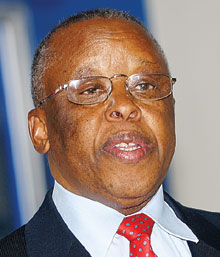Former Botswana leader: Fight AIDS by changing anti-gay laws
Colin Stewart is a 45-year journalism veteran living in Southern…
Festus Mogae, the former president of Botswana, joined with Stephen Lewis of AIDS-Free World last month in this appeal for the repeal of anti-gay laws that hinder the fight against HIV/AIDS:

In Uganda and across Africa, HIV continues to prey on women, sex workers and men who have sex with men.
It is clear that to end the HIV epidemic, we must protect and support these groups. Yet, our country and others enforce bad laws and customs that disempower these groups and make them more likely to be infected with HIV. We cannot hope for an HIV-free generation when we have laws that marginalize and punish those most vulnerable to the disease.
A global commission of legal, human rights and HIV leaders recently released a report that showed punitive laws were standing in the way of effective AIDS responses. Archaic laws and customs make women and girls more vulnerable to HIV. Legally condoned violence and oppression — including genital mutilation, sexual violence, denial of property rights and early marriage — undermine the ability of women to protect themselves.
Laws urgently need to protect women, who are often the ones left to care for the sick, tend to the family and till the fields. In addition, many countries have punitive laws that criminalize sex workers. However, these laws drive sex work underground and put sex workers at greater risk of HIV.
Police violence and the threat of arrest disempower sex workers, making them more vulnerable to abuse and HIV transmission. Many are unable to access prevention and care because of the stigma they face, even from healthcare workers. In contrast, sex workers who are not harassed by the police and who have access to services have lower HIV rates and more economic power.
Laws across the continent also criminalize homosexuality, yet punishing men who have sex with men forces them into secrecy. They are unable to access counseling and testing, making it almost impossible for HIV prevention and treatment interventions to reach them.
In 2008, when the Senegalese government jailed nine gay HIV outreach workers under a law prohibiting “acts against nature,” health workers went into hiding, advocacy groups disbanded and HIV treatment sites were shut down.
The time has come for African leaders to take action against bad laws that stifle our HIV response. We must challenge societal values rooted in fear and prejudice and implement laws based on human rights and sound public health. This starts with recognizing the rights of women and decriminalizing homosexuality and voluntary sex work, which is vital to protecting the health and dignity of these groups.
Voluntary sex work should not be confused with human trafficking, which remains an abhorrent human rights violation. Change will not come easy. It will require us to challenge tradition and deeply held personal values. It will mean confronting religious beliefs and antiquated practices that endanger our citizens.
Leaders will face shock, anger and opposition. But change is essential if we hope to slow the spread of HIV. Many leaders have refused to confront this reality. Instead, they opt to hide behind religion and the veneer of morality. But other leaders have demonstrated the courage needed to use laws as a powerful response to HIV.

In May, Malawi President Joyce Banda announced she would make efforts to repeal Malawi’s laws that criminalize homosexual acts. “As leaders, especially in this part of the world (Africa), which is the epicentre of the epidemic, we need to harness our efforts in confronting antiquated beliefs based on fear and misinformation that are codified in our laws and engraved in our cultures,” said President Banda.
In 2010, Rwanda Secretary of Health Agnès Binagwaho called for human rights-based policies that empower sex workers to negotiate safe sex and protect their health. Botswana enacted a law in 2008 to protect survivors of domestic violence and another in 2004 to establish equality of spouses. In recent years, 8,000 communities across the world, including in 15 African countries, banned genital mutilation.
Leaders in Uganda and across Africa must embrace change and follow these examples. We have a tremendous opportunity to accelerate the end of HIV. We must reverse laws and practices that stand in the way of effective HIV responses and replicate those that protect the human rights and health of our citizens.
Evidence-based, humane HIV responses will not only help shield us from HIV, they will also help build a more prosperous African continent. Africa’s leadership must boldly rise to the challenge. Together, we can turn the tide against HIV.
Festus Gontebanye Mogae and Stephen Lewis are members of the Global Commission on HIV and the Law.
Mogae is the former president of Botswana. Lewis is the co-director and co-founder of AIDS-Free World and was formerly the United Nations special envoy for HIV/AIDS in Africa.
This article previously appeared in AllAfrica.com under the headline “Uganda: AIDS Response Must Be Guided By Human Rights.
Related articles
- Botswana chiefs: ‘Homosexuality has always been here’ (76crimes.com)
- Bonela responds to the Evangelical Fellowship of Botswana on the issue of homosexuality in Botswana (legabibo.wordpress.com)
- AIDS-related deaths have fallen by nearly 40% since 2005 in Eastern and Southern Africa / A ten-fold increase in access to antiretroviral therapy has contributed to significant declines in AIDS-related mortality and an average increase in life expectancy (appablog.wordpress.com)




my comments are not being printed. this has happened before, Melanie
Dear Paula,
Comments here have to be moderated before they are published, which causes a delay, but most people’s comments are approved. Ones that are irrelevant or that threaten violence are blocked. I don’t remember blocking any of yours, however.
— Colin Stewart, editor of this blog
Thanks, Colin, I am always 100% behind you and others.